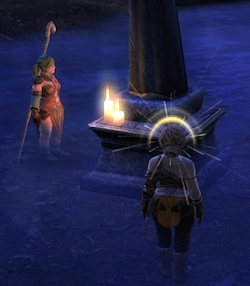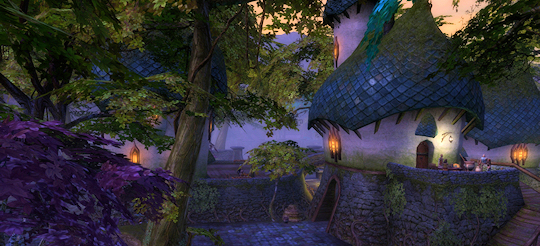 The finished version of RIFT (as finished as an MMO ever is) confirms most of my published pre-launch perceptions: It’s a strong MMO, perhaps even the strongest of the third-gen MMOs. Perhaps it’s even a transitionary fossil, a link between the WoW-era and the incoming SWTOR and GW2. I find it impossible to judge a game independent of what’s come before and what’s coming up, and I’ve rambled plenty on Massively about what RIFT’s gotten right, so I’d like to talk about three areas in which I think RIFT falls a bit short: the lack of global class diversity and roleplay immersion; the lack of engrossing non-combat gameplay; and the lack of dynamic-ness in the game’s dynamic events.
The finished version of RIFT (as finished as an MMO ever is) confirms most of my published pre-launch perceptions: It’s a strong MMO, perhaps even the strongest of the third-gen MMOs. Perhaps it’s even a transitionary fossil, a link between the WoW-era and the incoming SWTOR and GW2. I find it impossible to judge a game independent of what’s come before and what’s coming up, and I’ve rambled plenty on Massively about what RIFT’s gotten right, so I’d like to talk about three areas in which I think RIFT falls a bit short: the lack of global class diversity and roleplay immersion; the lack of engrossing non-combat gameplay; and the lack of dynamic-ness in the game’s dynamic events.
The illusion of class diversity
My musical background inclines me toward the Bard soul; I’ve been in love with Bards since a friend named Sildrehel showed me how to provoke demons through the walls of Hythloth way back in old school Ultima Online. One of the few positive experiences I had in EverQuest was my Bard and song-twisting mechanic. Since then, if a game has a bard class, I play it. DAoC. EQII. SWG. LotRO. Heck, even CoH has Sonic characters. If it doesn’t, I mope.
Unfortunately, the current lack of balance in RIFT means that most of the people around me are also strumming lutes. There’s an overabundance of Rogues, and nearly all of them have the Bard soul equipped, because they would be foolish not to — a hefty health boost as well as regen and speed songs come fairly early in the tree. Not only does it break my RP immersions to see stealthy backstabbers occasionally pulling out a noisy stringed instrument to buff their health, but it makes me feel completely mundane.
It’s not as though I’ve never played a game in which other people shared my class, of course. That would be a ludicrous expectation. There are probably a few hundred thousand Shamans in WoW with my same Restoration spec, and that’s never bothered me. But I think if well over 25% of all the players in the entire game were casually using totems, the totem-oriented class would lose most of its charm. It’s just jarring to be surrounded by people whose dabbling actually makes my specialization seem pointless and banal, especially when there are so many other games that manage to offer more than just the illusion of diversity. I can go months without seeing another copy of my character’s primary and secondary combo in City of Heroes, never mind epic pool, power pool, power, and slotting choices or costume customization. By comparison, RIFT’s much-touted soul system might seem customizable, but it doesn’t actually produce diversity among players.
It does, however, produce diversity internally for individual players. A single character can at any time swap between a four or more wildly different soul loadouts, turning him from a tank to a Bard to an Assassin in seconds. I made this same complaint about Guild Wars 2: While soul-swapping is a handy mechanic and means less level-grinding overall, a character’s identity is diminished when his role is so easily shifted. I realize I could just switch out the souls of my Bard and play a Ranger, but I made her to be a Bard. I didn’t craft a deep character backstory for her beyond “lol cute dorf” — I just don’t have the time to invest into RP for this particular game. But I can often live with that because I expect the character herself, along with her class and race, to provide a role for me to roleplay even to my lesser degree. The lack of that bothers me tremendously.
My WoW Warrior, for example, was written to be a tank, so she’s been Protection-spec’d since the day I rolled her, which happened to be the first day of WoW’s launch back in 2004. Protection stunk back then. Many times over the years I could have (and by some accounts should have) made her a Fury or Arms warrior for PvP’s or soloing’s sake, but that would have been a betrayal of the character as an idea. It would have turned a roleplaying character into an avatar of me, as the player, subject to any whim or FOTM, bound by not even so much as a simple time constraint when it comes to my full-scale reinvention of her abilities, all justified by extremely loose official canon rather transparently written for just such a purpose. I wouldn’t accept that in a story, so why accept it in an RPG?
Either my character is a musician or she isn’t. The fact that I can change my mind and change her entire identity in a split second feeds my selfish urges to bogart the buffet, but it doesn’t enhance class diversity game-wide, and it definitely drains some of the RP out of MMORPG. Curiously, the soul system is one of the things that places RIFT on the bridge between MMO generations, which is to say it’s a sign of the march of time, not a marker of any inherent progress — it’s a backlash against rigid, uncompromising class systems, but it’s not necessarily better. I find myself once again wishing for a true skill system instead. Oh, skill systems are terribly imperfect, but they offer no more balance or diversity problems than do souls while offering significantly more freedom upfront (rather than backloading choices in a way that stifles RP). Players do want choices, but if the choices are so easily undone and have no significance, they are meaningless.

Nice combat… where’s the rest of the game?
Housing, crafting, trading, roleplay, PvP… it’s really ridiculous that these things are considered secondary and unnecessary to so many games. Most games — WoW among them — aren’t really MMORPGs in the classic sense at all; instead, they’re MMFCSs — massively multiplayer fantasy combat simulators. When you strip away the “fluff,” you’re left only with repetitive monster-bashing.
RIFT hasn’t done anything to recommend itself here. Its crafting system is rudimentary and doesn’t exceed the pitifully low standard set by WoW, which is shameful in an era of mega-crafting MMOs like UO, SWG, Wurm, and Fallen Earth. PvP servers have factional open ganking and PvE servers are limited to sterile, instanced battlegrounds — no innovation has occurred on this front at all. Tools for roleplay (emotes, chat bubbles, taverns) are limited, and while the game is designed to bring people together to fight rifts, it does nothing to encourage communication at all let alone to reward actual roleplay. Housing is simply not present, and though Scott Hartsman told me personally it might be included sometime post-launch, I’ve heard that before, and besides, whenever a system isn’t included at launch, we all know that it won’t be truly integrated even if added, because the original game simply wasn’t designed around it. LotRO’s feeble attempt at housing is a perfect example of how not to add housing post-launch — it’s so separated from the game off in its little instances that it goes largely unused except as storage.
You might object that my true complaint is only that RIFT hasn’t incorporated more sandbox elements into its themepark, and you’re not wrong, except in that we’ve all allowed ourselves to be lulled into believing that games don’t really need much beyond monster-bashing and a few copycat systems in the first place — we’ve started believing that there’s even such as thing as a “sandbox element” and accepted that those elements are optional. The fact that we have two words for these types of games (one game with stuff to do, and the other that’s just a rat-killing simulator) should upset us greatly. The divergence in design occurred with EverQuest and was cemented with WoW; the companies began asking themselves how little they could publish and still keep subs, all under the pretense of some “noble” desire to polish one system (combat) to the “unfortunate” exclusion of all else. That RIFT failed to break the trend (and it certainly could have, given LotRO’s and EQII’s successes) is a black mark on its reasonably good name and a very bad precedent for the genre. I rarely give games without some form of housing and crafting a first glance nowadays. There are just too many other great choices for games you can live in rather than play at.

“Dynamic” events
Rifts and invasions are fun, but they are not really dynamic in an MMO sense.
My understanding of the term is this: A dynamic event is an event that is unique or out of the ordinary for its setting and that changes the landscape and the environment for a relatively long period of time. A GM might spawn a battalion of orcs at Cove, take over a sand giant and go on a rampage in the Oasis of Ro, paint a Gharu’ndim city with snow and arrive in the guise of a god to duel with players… these would be dynamic events. I’d also include unpredictable one-time scripted events, such as the invasion that saw UO’s Magincia razed to the ground in 2007 or the end-times events that WoW introduced prior to the Cataclysm launch. A dynamic event is meant to be special — it doesn’t reoccur, it usually requires some sort of personal intervention on the part of staff, and it frequently either creates or ushers in a permanent change (OK, so in the case of EQ, the change was that we stopped hunting in Oasis, but that’s for another rant).
At the other end of the spectrum are static events. Static events are usually fairly ordinary for their settings because they (contrary to expectation) reoccur and/or are repeatable. They are always pre-scripted and require no additional staff intervention. They also have no lasting impact on the gameworld, as they are designed to be participated in by many players over a much longer period of time, and very few games as yet implement LotRO’s and WoW’s layered instancing to show zone changes only to those who are on the proper quest stage. The repeating holiday events of SWG, EQII, and WoW would all fall into this category.
RIFT does not have dynamic events — it has random static events. The events reoccur seemingly at random in fairly predictable locations, and they do predictable things because they’re entirely scripted. They have only a temporary impact on the world. They require no staff intervention; there is no amount of event customization or live manipulation or interaction. The game code is generating the number and type of events based on the number of players nearby, but that alone doesn’t make the event dynamic. That just means it’s scaling in much the same way that GW scales its hub zone sizes based on population or CoH scales instance difficulty based on the size of player groups. RIFT events paint an illusion of dynamic-ness, but once you stand far enough away, you see that they’re merely scaled and random, a bit like taking the clone brush in Photoshop and dabbing it here and there.
Paul likens this effect to the free will argument. People who rebel against the idea of pre-destination (scripted, static events) are often told that the only alternative is randomness (random, static events), when what the rebels actually want to believe in is a third option: intentionality (GM-crafted, dynamic events). While that third option doesn’t exist in real life (and free will is only an illusion), it does exist in games in the form of the creators and actors of intentional, custom, and environment-changing events. (Paul also regards my characterization of dynamic events as incorrect, and I concede that, on some level, I am trying to argue the difference between math and art, but so be it — RIFT’s invasions do feel like a sterile numbers game, not like a loving creation or engrossing story.)
The misapplication of the term dynamic events to describe RIFT’s invasion/rift system could be just another footnote in the long sad history of broken MMO terminology (remember back when “persistent world” actually referred only to open-world sandboxes and not to instance-based themeparks, which are made up of lots of non-persistent bits?). But that’s unfair to all the games that came before with truly dynamic events, games like Asheron’s Call, EverQuest, and Ultima Online — as far back as 1997. It’s hard to find a more impressive dynamic event than the invasion of Magincia I noted above, which gave players the tools to save or destroy the city (they chose to destroy it on all shards because the loot was better, but that’s a different lesson). The UO team is currently implementing a new event to allow players to rebuild the city themselves. It’s impossible to look at RIFT’s events as anything but random and repetitive in light of a real dynamic event like Magincia. Consequently, I’m uncomfortable allowing RIFT to co-opt and rewrite the term for the next generation of gamers, who will come to believe that RIFT is as dynamic as it gets and who may never know what it’s like to attend a hand-written, custom, GM-led quest in an MMO.
I am not sorry that RIFT’s events exist. True dynamic events are expensive and may not reach as many players as RIFT’s invasions, so an alternative to the painstaking and time-consuming dynamic events I describe is welcome. But it’s certainly much easier to get bored during your 10th rift-closing of the night — not so much when you’re busy helping an EM overthrow the old king to become queen and take the story of the shard in a wildly different direction, or attending your own wedding as officiated by a favorite GM.
Still, as Paul points out, few MMOs since UO have created events with such a sense of errantry as RIFT. He loves that the random events pull him from his course and change his plans. I tend to find it more annoying than amusing, but he’s not wrong — rifts do dictate our play, for better and worse. But in this themepark, I find that I don’t really want to ride the same rollercoaster a hundred times. I’m content to ride it once, and then I want to play some carnival games, ride the Chinese swings, and watch some street magic just for the tiny crowd that’s gathered.
Ultimately, while the game is entertaining and succeeds marvelously in that purpose, I find myself disappointed by what turn out to be phantoms of hype: the triple illusions of class diversity, gameplay depth, and dynamic events.
You’ve made a solid point regading only RP point of view in RIFT. I agree on “random events” and grafics but i have to add that beyond a cool/cute/etc looking character there’s also mechanics missing. And by mechanics I mean math, how a toon stats behave during a “phase”. To be more clear how does a random mechanic works in tanking abilities. More to the point : avoidance.
From what I experienced with my rogue ( riftstalker/blade dancer/bard) there is a big isssue with avoidance in expert dungeons. By doing simple math this should have not happen, but it does. So either my math is wrong or Rift game mecanisc are not intune with stats.
All that hype about graphics/content/gameplay is just not enough. Groing tired looking at my female High Elf perfect shaped ass and getting raped as tank randomly.
RP or not this is not only a good picture to look at. Again getting tired of this focus for good looking and no brain game.
If this was to harsh or blunt its like that to show the depth of my discontent.
cheers,
Helgarth of Shivermare
P.S.
Great post and well written.